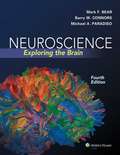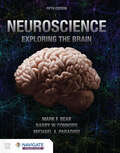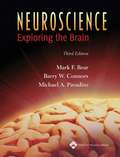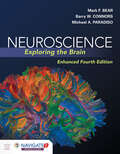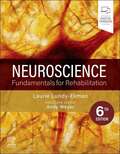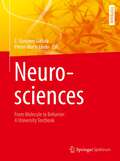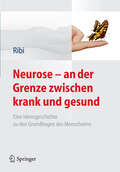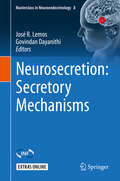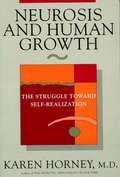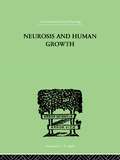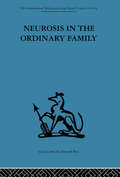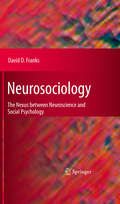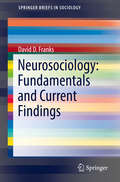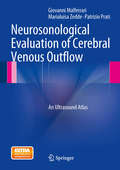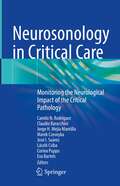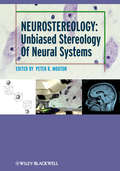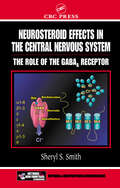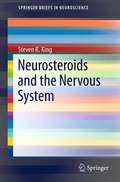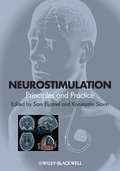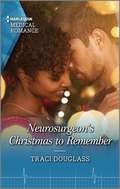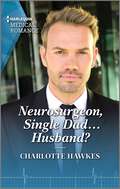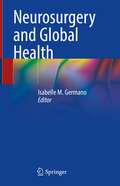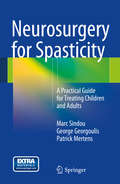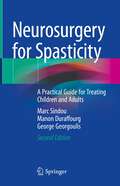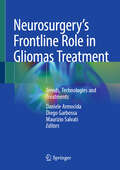- Table View
- List View
Neuroscience: Exploring The Brain (Fourth Edition)
by Mark F. Bear Michael A. Paradiso Barry W. ConnorsAcclaimed for its clear, friendly style, excellent illustrations, leading author team, and compelling theme of exploration, Neuroscience: Exploring the Brain, 4e takes a fresh, contemporary approach to the study of neuroscience, emphasizing the biological basis of behavior. The authors' passion for the dynamic field of neuroscience is evident on every page, engaging students and helping them master the material. In just a few years, the field of neuroscience has been transformed by exciting new technologies and an explosion of knowledge about the brain. The human genome has been sequenced, sophisticated new methods have been developed for genetic engineering, and new methods have been introduced to enable visualization and stimulation of specific types of nerve cells and connections in the brain. The new Fourth Edition has been fully updated to reflect these and other rapid advances in the field, while honoring its commitment to be student-friendly with striking new illustrations, additional animations, and an unparalleled array of online resources.
Neuroscience: Exploring the Brain
by Michael A. Paradiso Mark Bear Barry ConnorsNeuroscience: Exploring the Brain, Fifth Edition delivers a comprehensive, student-friendly introduction to the structure and function of the nervous system. Updated to reflect the latest research, this edition blends foundational science with engaging, real-world applications, making it ideal for introductory neuroscience or biological psychology courses across a wide range of departments, from psychology to allied health. With an approachable tone, expanded illustrations, and thoughtful pedagogy, this trusted text makes complex topics more accessible, even for students without a strong background in science.The Fifth Edition is distinguished by its clarity, adaptability, and practical relevance. It engages students through clear explanations, relatable scientific stories, and real-world connections, making complex material easier to grasp. Instructors also benefit from features that streamline course planning and support a variety of teaching and learning styles. Updated Content and Illustrations: Chapters reflect new neuroscience research, with improved visuals for improved clarity and engagement.Neuroscience and Medicine Boxes: Highlight the significance of material and connect concepts to real-world medical applications.Path of Discovery Boxes: Firsthand accounts from field experts and Nobel laureates that outline key discoveries and their broader impact.Brain Byte and Brain Food Boxes: Curiosity-sparking sidebars that offer fun facts or deeper dives into select topics to keep students engaged.Student-Focused Pedagogy: Each chapter includes learning objectives, review questions, and a glossary to reinforce understanding.Instructor Resources: Lecture slides, test questions, and chapter outlines that save instructors time and support effective course delivery. © 2026 | 975 pages
Neuroscience: Exploring the Brain (Third Edition)
by Mark F. Bear Barry W. Conners Michael A. ParadisoNeuroscience: Exploring the Brain surveys the organization and function of the human nervous system, presenting material at the cutting edge of neuroscience, in a way that is accessible to both science and nonscience students alike. The book is divided into four parts: Part I, Foundations; Part II, Sensory and Motor Systems; Part III, The Brain and Behavior; and Part IV, The Changing Brain.
Neuroscience: Exploring the Brain, Enhanced Edition
by Mark Bear Barry Connors Michael A. ParadisoAcclaimed for its clear, friendly style, excellent illustrations, leading author team, and compelling theme of exploration, Neuroscience: Exploring the Brain, Fourth Edition takes a fresh, contemporary approach to the study of neuroscience, emphasizing the biological basis of behavior. The authors’ passion for the dynamic field of neuroscience is evident on every page, engaging students and helping them master the material. In just a few years, the field of neuroscience has been transformed by exciting new technologies and an explosion of knowledge about the brain. The human genome has been sequenced, sophisticated new methods have been developed for genetic engineering, and new methods have been introduced to enable visualization and stimulation of specific types of nerve cells and connections in the brain. The Fourth Edition has been fully updated to reflect these and other rapid advances in the field, while honoring its commitment to be student-friendly with striking new illustrati
Neuroscience: Fundamentals For Rehabilitation
by Laurie Lundy-EkmanUse your knowledge of the nervous system to understand and treat neurologic disorders! Neuroscience: Fundamentals for Rehabilitation, 6th Edition provides an illustrated guide to neurology and how it affects the practice of physical and occupational therapy. Case studies and first-person stories from people with neurologic disorders make it easier to develop clinical reasoning skills and apply your knowledge to the clinical setting. This edition includes an enhanced eBook free with each purchase of a new print book. Written by noted PT educator Laurie Lundy-Ekman, Neuroscience uses evidence-based research to help you evaluate and treat clients who have physical limitations due to nervous system damage or disease.
Neurosciences - From Molecule to Behavior: a university textbook
by Pierre-Marie Lledo C. Giovanni GaliziaNeurosciences - a comprehensive approach This textbook covers neuroscience from cellular and molecular mechanisms to behavior and cognitive processing. We also address evolution of the nervous system, computational neuroscience, the history of neuroscience as a discipline and neurophilosophy - to name but a few. The book provides the newest state-of-the-art knowledge about neuroscience from across the animal kingdom, with particular emphasis on model species commonly used in neuroscience labs across the world: mouse, zebra fish, fruit fly, honeybee, and nematode worm. We aim at university students of neuroscience, psychology, biological sciences, and medical sciences, but also computer scientists, philosophers, or anybody interested in understanding how brains work.
Neurose - an der Grenze zwischen krank und gesund
by Alfred RibiNeurotische Störungen sind sehr verbreitet. Freud sagte sogar: "Jedermann ist etwas neurotisch." Man kann natürlich etwas, was in der Bevölkerung dermaßen verbreitet ist, nicht als krankhaft, d.h. als Abweichung von der Norm bezeichnen. Kann man es deshalb aber von "Gesundsein" abgrenzen? So wenig wie eine Frau ein bisschen schwanger sein kann, so wenig kann einer ein bisschen neurotisch sein. Die Jung'sche Auffassung von der Neurose hilft, diagnostisch Klarheit zu schaffen. Dieses Buch ist zunächst ein Buch für Fachleute, es ist aber auch ein "Aufklärungsbuch" für interessierte Laien, das die veralteten Vorurteile über das Wesen der Neurose abbauen hilft. Geschrieben für Psychologen und Psychiater, Absolventen einer Jung'schen Ausbildung, interessierte Laien.
Neurosecretion: Secretory Mechanisms (Masterclass in Neuroendocrinology #8)
by José R. Lemos Govindan DayanithiHow do electrical activity and calcium signals in neurons influence the secretion of peptide hormones? This volume presents the current state of knowledge regarding the electrical, calcium signaling and synaptic properties of neuroendocrine systems from both vertebrate and invertebrate systems. The contributions span in vivo and in vitro studies that address: state‐dependent plasticity, relevance of firing patterns, membrane properties, calcium flux (including dynamic imaging and homeostasis), and molecular mechanisms of exocytosis, including from non-neuronal secretory cells. The chapters focus not only on research results but also on how experiments are conducted using state-of-the-art techniques, and how the resulting data are interpreted.While there are many books on the secretory properties of neurons, this is the first to focus on the distinctive secretory properties of neuroendocrine neurons. Accordingly, it offers an important text for undergraduate and graduate neuroscience students, and will also appeal to established scientists and postdoctoral fellows. This is the eighth volume in the Masterclass in Neuroendocrinology series* - now a co-publication between Springer Nature and the INF (International Neuroendocrine Federation). *Volumes 1-7 published by Wiley
Neurosis and Human Growth: The Struggle Toward Self-Realization
by Karen HorneyDr. Horney discusses the neurotic process as a special form of the human development, the antithesis of healthy growth. She unfolds the different stages of this situation, describing neurotic claims, the tyranny or inner dictates and the neurotic's solutions for relieving the tensions of conflict in such emotional attitudes as domination, self-effacement, dependency, or resignation.
Neurosis and Human Growth: The struggle toward self-realization (International Library Of Psychology Ser.)
by Karen HorneyIn Neurosis and Human Growth, Dr. Horney discusses the neurotic process as a special form of the human development, the antithesis of healthy growth. She unfolds the different stages of this situation, describing neurotic claims, the tyranny or inner dictates and the neurotic's solutions for relieving the tensions of conflict in such emotional attitudes as domination, self-effacement, dependency, or resignation. Throughout, she outlines with penetrating insight the forces that work for and against the person's realization of his or her potentialities. First Published in 1950. Routledge is an imprint of Taylor & Francis, an informa company.
Neurosis in the Ordinary Family: A psychiatric survey
by Anthony RyleTavistock Press was established as a co-operative venture between the Tavistock Institute and Routledge & Kegan Paul (RKP) in the 1950s to produce a series of major contributions across the social sciences. This volume is part of a 2001 reissue of a selection of those important works which have since gone out of print, or are difficult to locate. Published by Routledge, 112 volumes in total are being brought together under the name The International Behavioural and Social Sciences Library: Classics from the Tavistock Press. Reproduced here in facsimile, this volume was originally published in 1967 and is available individually. The collection is also available in a number of themed mini-sets of between 5 and 13 volumes, or as a complete collection.
Neurosociology
by David D. FranksThe goal of this ground-breaking volume is to present how neuroscience research is relevant to sociologists and social psychologists as well as examining those areas of neuroscience that can refine and broaden sociological theory. The study of the brain and its effect on behavior grew to prominence in the mid-20th century. Neuroscientists and psychologists worked together in this area in the behavioral sciences but neuroscience has not had a big impact in sociology and the social sciences. Recently, neuroscientists have presented new research which has a direct impact on many areas of sociology. These include the human "self", the social nature of mind, socialization and language acquisition, role-taking and role-making, consciousness, intersubjectivity, a balanced social constructionism, human agency and the necessity of emotion for rational decision making. These are only some of the areas of sociology which and to which they have contributed important refinements.
Neurosociology: Fundamentals and Current Findings (SpringerBriefs in Sociology)
by David D. FranksThis book offers an introduction to the fundamentals of neurosociology and presents the newest issues and findings in the field. It describes the evolution of the brain and its social nature. It examines the concept of knowing and what can be known, as well as the subjective sensations we experience. Next, it explores the ubiquitousness of New Unconsciousness and the latest conclusions about mirror neurons. Additional themes and concepts described are sex differences in the brain, imitation, determinism and agency.The book brings together neuroscience and sociology, two fields that are very different in terms of method, theory, tradition and practice. It does so building on the following premise: If our brains have been forged evolutionarily over the many centuries for social life, sociologists should have the opportunity, if not the duty, to know about it whatever the reservations of some who think that any approach that includes biology must be reductionistic.
Neurosonological Evaluation of Cerebral Venous Outflow
by Giovanni Malferrari Marialuisa Zedde Patrizio PratiAlthough, within neurosonology, study of both the extracranial and the intracranial circulation began at least 15 years ago, it is only in recent years that ultrasound evaluation of cerebral veins and cerebral venous hemodynamics has attracted wider attention. Nevertheless, the huge variability in venous outflow pathways in normal subjects means that the potential usefulness of this examination is still often neglected. This atlas provides concise descriptions of the main normal and pathological ultrasound features of the cerebral venous circulation for neurosonologists and clinicians. It is designed as a practical tool that will be of assistance in everyday practice in the ultrasound lab and will improve the knowledge of sonologists and the reliability of venous ultrasound studies. The multimedia format, with detailed images, explanatory videos, and short, targeted descriptions, ensures that information is clearly conveyed and that users will become fully acquainted with the variability of normal findings of venous examinations. The atlas will be of value both to trainees in this field of ultrasound and to neurosonologists who are beginning to perform venous examinations in addition to arterial extra- and intracranial examinations.
Neurosonology in Critical Care: Monitoring the Neurological Impact of the Critical Pathology
by László Csiba Claudio Baracchini Marek Czosnyka José I. Suárez Camilo N. Rodríguez Jorge H. Mejía Mantilla Corina Puppo Eva BartelsThis textbook addresses the classical use of Transcranial Doppler (TCD) and Transcranial Color-Coded Duplex Sonography (TCCS), focusing on the usefulness of neurological monitoring beyond classical acute brain injuries present in the daily intensive care medical practice. It encompasses a wide range of critical pathologies where neurological impact is part of clinical evolution, offering practical approaches for managing, application and interpretation of neurosonology to assist the physician to making real-time individualized decisions at bedside.It is an academic guide developed and edited by international experts being a very useful resource in daily practice for intensivists, neurologists, neurosurgeons and other specialists involving in critical care.
Neurostereology: Unbiased Stereology of Neural Systems
by P. R. MoutonStereological methods provide researchers with unparalleled quantitative data from tissue samples and allow for well-evidenced research advances in a broad range of scientific fields. Presenting a concise introduction to the methodology and application of stereological research in neuroscience, Neurostereology provides a fuller understanding of the use of these methods in research and a means for replicating successful scientific approaches. Providing sound footing for future research, Neurostereology is a useful tool for basic and clinical researchers and advanced students looking to integrate these methods into their research.
Neurosteroid Effects in the Central Nervous System: The Role of the GABA-A Receptor (Frontiers in Neuroscience)
by Sheryl S. SmithPresenting a complete overview of the effects of steroid hormones in the brain and describing new methods for investigating these effects, this book discusses theories on steroid action in the central nervous system and the techniques for receptor localization and quantification and enzyme regulation. The author explores the use of transgenic/antisense strategies to determine sites and the cellular effects of steroid action in the brain. He covers steroid action on mood, cognition, sensorimotor action, neuroprotection, and plasticity, and describes methods using molecular, electrophysical, and behavioral techniques to link cellular mechanisms of steroid action with behavioral effects.
Neurosteroids and the Nervous System
by Steven R. KingWhile steroids from the periphery have profound effects on the nervous system, the nervous system also produces its own steroids de novo ("neurosteroids"). The physiological importance of neurosteroids is beginning to be understood. These steroids potentially have roles in sedative/hypnotic behavior, anxiety, learning, and memory. At the cellular level, neurosteroids affect neuronal excitability, synaptic plasticity and cell proliferation and survival. Early findings hold promise for future strategies to treat specific psychologicalconditions and neurological diseases. This Brief will focus on the current state of understanding of brainderived neurosteroids.
Neurostimulation
by Konstantin Slavin Sam EljamelCould neurostimulation be a management option for your patients?Neurostimulation techniques present real management options for patients with a range of neurologic and psychiatric disorders, such as movement disorders, pain and depression. They should be actively considered when conventional medical approaches have failed or are inappropriate. But for many clinicians, these new methods pose many questions. What are the available modalities? How do they work? Which patients might benefit from them? How do I explain the processes to patients? How do I monitor my patient's progress after implantation?Neurostimulation provides a concise, easy-to-read fusion of the clinical applications of implanted neurostimulators. It demystifies selection and referral criteria, maximizing therapy, programming the implanted neuromodulators, monitoring progress and troubleshooting problems associated with neurostimulation.Written by an international cast of experts, Neurostimulation, sets the stage for you to provide real clinical benefit to your patients who might receive, or are already using, neurostimulators.
Neurosurgeon's Christmas to Remember (Royal Christmas at Seattle General #2)
by Traci DouglassChristmastime with a stranger—A lifetime together?Neurosurgeon Maxwell is determined to atone for the one life he couldn’t save…his late wife’s. Set to perform delicate surgery on a king, Max finds himself shadowed by PR director Ayanna. They must work together to keep the king’s case a secret. But when Ayanna temporarily moves in to Max’s apartment, they face a very different type of tension—their undeniable attraction!From Harlequin Medical: Life and love in the world of modern medicine.Royal Christmas at Seattle GeneralBook 1: Falling for the Secret Prince by Alison RobertsBook 2: Neurosurgeon’s Christmas to Remember by Traci DouglassBook 3: The Bodyguard’s Christmas Proposal by Charlotte HawkesBook 4: The Princess’s Christmas Baby by Louisa George
Neurosurgeon, Single Dad...Husband?
by Charlotte HawkesIs the nurse the missing piece to this brand-new family? Find out what happens in the latest Harlequin Medical Romance novel by Charlotte Hawkes.A nurse to save……the single dad! When neurosurgeon and notorious bachelor Seth becomes the guardian of his nephew Noah, for the first time in his life, he has no idea what he&’s doing. Noah hasn&’t spoken since his mother&’s passing, so when nurse Andrea gets him to speak, Seth enlists her help. Andrea understands what Noah is going through and brings a sparkle back into this little boy&’s life—and Seth&’s, too! Is she the bright future this fledgling family deserves?From Harlequin Medical: Life and love in the world of modern medicine.
Neurosurgery and Global Health
by Isabelle M. GermanoThis book is a combination of ideas and experiences from over 100 dedicated and brilliant neurosurgeons around the world. Their common goal is to provide data for a deeper understanding of the multi-faceted aspects of neurosurgery and, by doing so, to better serve patients across the globe. Scientific curiosity, deep dedication, incredible work ethics, entrepreneurship, and creativity are the common traits among all neurosurgeons, and not the exception. By allowing readers to see the field of neurosurgery from the perspectives of surgeons spanning five continents, this book serves to provide multiple, diverse viewpoints and to build a foundation for future collaborations. The book’s 24 chapters are organized into 3 parts.Part I provides the reader with an overview of the role of neurosurgery in worldwide health care, its evolution over the past decades, the current state and future directions of each neurosurgical subspecialty across the five continents. Over the years, the overarching goal for neurosurgeons has been to develop new, more effective and high-end solutions for complex diseases and to provide access to neurosurgical services for all patients.Part II discusses the differences and similarities of neurosurgery education and training across the globe, providing a snapshot of how new tools, technology, and paradigms reduce inequality and increase access to neurosurgical education. Educational accomplishments and challenges still present for the in different regions of the world are reviewed.Part III focuses on economic aspects influencing neurosurgery globally, including how to make efficient decisions in the face of scarcity, yet demand. The authors provide theories, models, and tools helpful to apply when planning to allocate resources, not just financial, but also human and intellectual. A deeper understanding of economics does not necessarily provide the answer to the problem; rather it provides the tools to find an answer, or, ideally, multiple possible solutions.Neurosurgery and Global Health is the first comprehensive guide to the role of neurosurgery in the global health care sphere, providing an in-depth compendium about the understanding of the neurosurgical role within global health, its efforts in the education of tomorrow’s workforce, and the economic aspects driving the field.
Neurosurgery for Spasticity
by Marc Sindou George Georgoulis Patrick MertensThe book is devoted to the neurosurgical management of spasticity. Starting with a chapter on the anatomical and physiological foundations of spasticity and a short history of its neurosurgical treatment, it describes the neurosurgical methods currently available. As management differs between adults and children, the book is also structured accordingly, including evaluation, decision-making, Intrathecal Baclofen Therapy (ITB), botulinum toxin therapy and surgery. Beyond ITB, the neurosurgical options covered include procedures focusing on the peripheral nerves, dorsal roots, Dorsal Root Entry Zone and spinal cord. Based on surgical experience collected with more than a thousand patients, the book gathers the most important aspects of our present understanding, presented using a practical, educational approach. It stresses the importance of a multidisciplinary approach, including neurologists, pediatricians and rehabilitation specialists. Close collaboration with other surgical disciplines like orthopedic surgery and neuro-urology are also outlined.
Neurosurgery for Spasticity: A Practical Guide for Treating Children and Adults
by Marc Sindou George Georgoulis Manon DuraffourgThe book, in its second edition, is devoted to the neurosurgical management of spasticity and focal dystonia. Starting with a chapter on the anatomical and physiological bases of spasticity and a short history of its neurosurgical treatment, it describes the neurosurgical methods currently available. As management differs between adults and children, the book is also structured accordingly, including evaluation, decision-making, Intrathecal Baclofen therapy (ITB), Botulinum toxin therapy and Surgery. The large spectrum of scales for assessing hypertonia, spasticity, dystonia, contracture and joint/bone deformities, as well as the scoring systems for quantifying functional abilities are critically reviewed. Beyond ITB, the neurosurgical options covered include the microsurgical procedures focusing on the peripheral nerves, dorsal roots, Dorsal Root Entry Zone and spinal cord, and their intra-operative monitoring. In this second edition, the orthopedic surgical interventions available will take a large place, either as alternative solutions , or even better as important complements after spasticity be solved by the neurosurgical treatments. Based on surgical experience collected with more than a thousand and eight-hundred patients, the book gathers the most important aspects of our present understanding, presented using a practical, educational approach. It stresses the importance of a multidisciplinary approach, including neurologists, pediatricians and rehabilitation specialists. Close collaborations with other surgical disciplines like orthopedic surgery and neuro-urology are outlined.
Neurosurgery's Frontline Role in Gliomas Treatment: Trends, Technologies and Treatments
by Daniele Armocida Diego Garbossa Maurizio SalvatiGliomas are an incurable disease of the central nervous system. In recent years, important milestones have been achieved in understanding the pathogenetic and molecular mechanisms of gliomas, with numerous oncological, molecular and neuroradiological studies. The first important therapeutic step, however, remains surgery. The neurosurgeon is almost always the first specialist who poses the diagnostic suspicion and takes charge of the patient, and a radical and safe surgical intervention greatly influences the patient's prognosis. The different surgical approach strategies, new technologies and trends are summarised in this volume. Edited by a leading expert in the field and authored by a team of recognised specialists, this book addresses all the most important updates on the understanding of gliomas, analyses them from all perspectives and studies their neurosurgical aspect. It will be a valuable resource for neurosurgeons, medical oncologists, neuro-oncologists and neurologists.
